Elden Ring Review
One ring to rule your soul
Like Metroid, GTA, and Diablo before it, when Demon's Souls released on PS3 in 2011, it started a whole new subgenre. Developers FromSoftware probably didn't expect that their third person RPG with a unique combination of clever level design, imposing boss battles, and unwavering high difficulty would put them in the spotlight and spawn countless imitators. But the hardcore experience resonated with players, and allowed the studio to hone in on this style of gameplay. Following multiple sequels, and spinoffs in the form of Sekiro and Bloodborne, the developers have now returned to their main line of games with Elden Ring – the hardcore action RPG that takes the Dark Souls formula to an open world format.
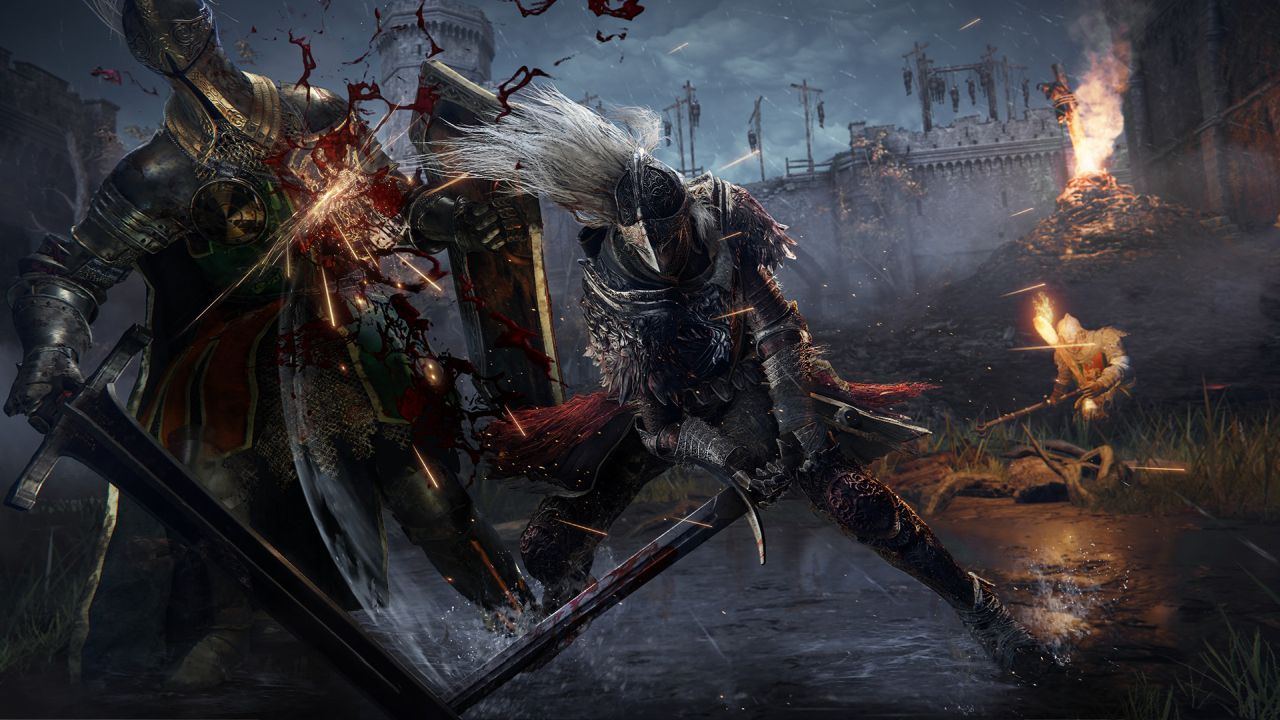
The narrative is once again a cryptic one, though the basic premise is intriguing enough. Players assume the role of The Tarnished, an exile that has returned to the Lands Between. Your hope is to collect the Great Runes, which are pieces of the titular Elden Ring that has been shattered some time prior. In doing so, you would become an Elden Lord, securing your worth and demigod status. But of course, in your way lies a large and dangerous world, a variety of hostile creatures, and multiple demigods who hold pieces of the Ring. You'll have to explore and fight your way through them all in order to succeed.
If you've had a chance to play any of the previous games, you are going to be very familiar with the core mechanics. Players first select a starting class, though for the most part that simply helps define what kind of weapons and playstyle you prefer, by pre-allocating your character stats. It doesn't lock you into anything, and you can switch things around as you level up. The stats screen may look quite imposing, but the basics of it remain the same – the main attributes of Vigor (HP), Endurance (stamina), Strength, Dexterity, Intelligence, Faith, Mind, and Arcane are what define your survivability and damage output. With that, you're thrown out into the world.
In the opening moments, you'll learn the basics of light and heavy attacks, blocking, and dodging, as well as using your starting weapon. For the most part, this third-person action game remains focused on melee combat, though there are still opportunities to be a magic caster, a ranged weapon specialist, and everything in between. The controls remain simple, and there's still the use of the D-pad to swap between a few different weapons you can have equipped, as well as your magic spells, healing potions, and other special items for quick-use. The third person camera can be a little unwieldy at times, though probably slightly improved from the previous games. You can also do a traditional jump now, which expands exploration and traversal options, and lets you do a leaping attack. This is definitely a continuation of Dark Souls - it lacks the intensity and aggression focus of Bloodborne, or the timing/parry and more fixed nature of Sekiro.
The world is full of creatures that want to kill you, big and small, hiding around corners and standing guard at staircases and entrances. You'll have to fight your way through, and you will probably die a lot – the enemies are unforgiving and deal plenty of damage, have shields, and lots of friends. The foundations of Dark Souls combat remain - you'll dodge a lot, track enemy attack patterns, and choose the best moment to strike and get out of the way. You'll have to keep an eye on your health and stamina bars (and the mana bar if you're casting). Thankfully (perhaps on purpose), the enemy AI remains individual and allows for separation of groups – you can hack away at a monster, and as long as the others are looking the other way, they won't care even a few feet away. Having said that – there are some enemies that need to be taken out first if possible, as they will alert all others nearby.
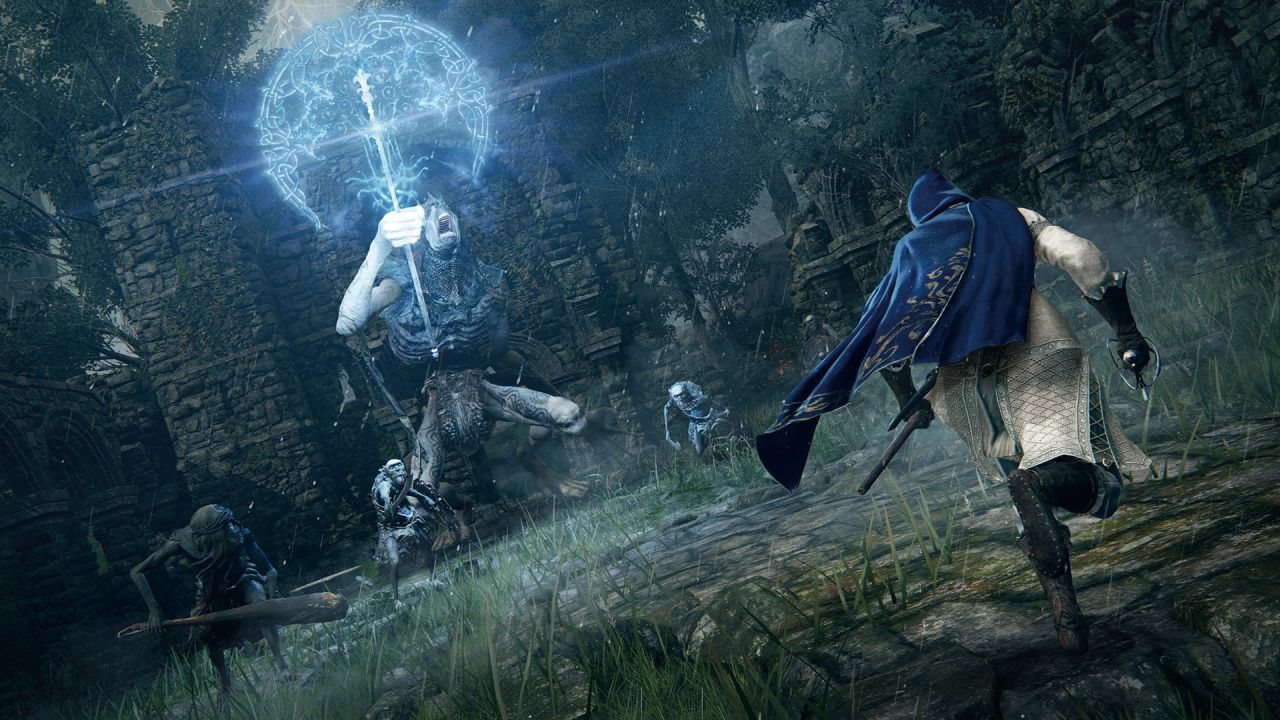
Things start off easy enough, as you bring down the starting area monsters with just a few hits, but players should not be fooled – this is just as hardcore of an experience as usual. The game almost instantly puts you into a boss fight that you're supposed to lose, and things only get more challenging from there. Dying will make you drop whatever unspent Golden Runes (the game's currency) you were carrying. You will respawn at the nearest bonfire (called Sites of Grace), and have to make your way back to recover the Runes. Anytime you respawn, fast travel, or choose to rest at the bonfires to recover your health or level up, it once again resurrects all enemies in the world (except bosses). These punishing and yet addicting basics of the "souls-like" gameplay loop continue to live on in Elden Ring, and if it's not something you enjoyed or were good at in the past, the new title is unlikely to change your mind.
Inventory management remains a key aspect. You need Runes to both level up your stats, and also shop at vendors, creating the usual agonizing decision. You'll collect a variety of equipment from fallen enemies and just scattered around the world, helping to expand your weapons and armor sets, each offering different looks and stats, along with their attribute scaling rating which improves their effectiveness. Equipment still has different weight values, so heavy armor may protect you better, but limit your dodge ability and stamina. You will also find upgrade components that level up your weapon stats at the crafting vendor. From small daggers to swords that you have to carry over your shoulder, the ability to have a shield or dual-wield katanas, or perhaps an off-hand magic wand, there is plenty of variety. One new aspect that adds even more flexibility is the Ashes of War system – which lets you replace the weapon skills and affinities, instead of them being fixed like in the past games, giving more opportunities to stick to your favorites.
And you'll need as much flexibility as you can get. Boss battles continue to be a staple moment, where you will be locked into a room or a larger area and have to fight a bizarre and haunting creature that's usually at least twice your size, though often much bigger. Boss battles remain at the pinnacle of the difficulty level, and Elden Ring features probably the toughest enemies that the franchise has ever had. The challenge comes from their large health bars and the absolutely overwhelming amount of attacks that they possess. It's a relentless assault on the senses as they jump, dodge, spin, and deliver incredibly painful blows and area attacks that carve out half your health bar. You can try to learn their attack patterns, but there is a ton of variety, pauses before strikes, and nearly 360-degree area attacks that punish your attempts to endlessly dodge instead of parrying. They also love to have multiple stages that can change the fight entirely in the second half. These battles are not for the faint of heart, and act as true skill checkpoints for what's to come. This is also where the camera issues become the most apparent, as there's simply a ton of special effects and quick movement to keep up with, and especially in smaller spaces it becomes a hindrance.
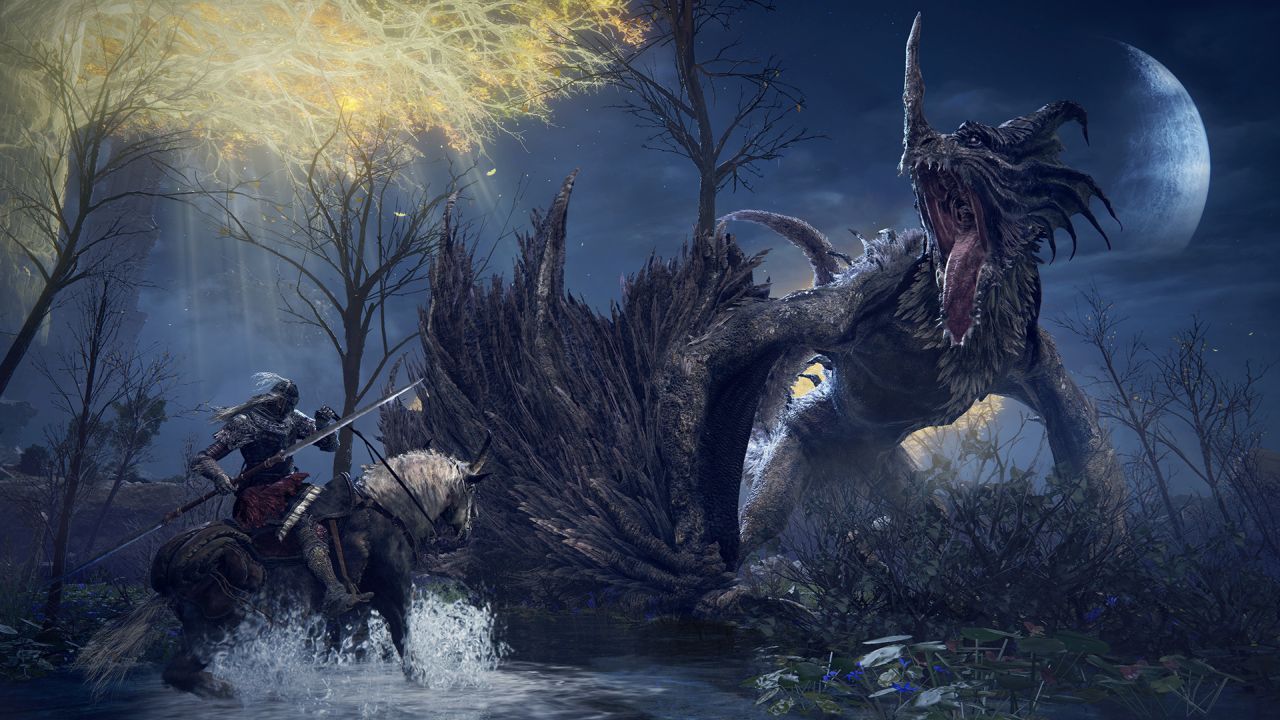
While all of these basics remain largely the same, where Elden Ring begins to shine and diverge from its predecessors is the switch to an open world design. While previous games featured some excellent and compact level design, Elden Ring is like a bunch of those games put together, and spread over a large open area. There are occasional linear paths that make you fight a boss before you can reach the next large open section of the map, but on the whole there is a lot of player freedom in terms of where to go. And despite this large change in scope, the developers have done an incredibly good job of adapting the signature gameplay to the new setting. There are large open areas that often contain a scattering of decaying ruins, collapsed buildings, and imposing cliffs – each likely holding secrets, new strangers to meet, and items to find. The more open areas allow the developers to get really creative with positioning, patrols, and scripted events.
The world is perhaps not huge by typical modern game standards – but because of the slow and methodical approach to gameplay, it takes a while to explore, and you are looking at easily over 40 hours. The constantly palpable tension of enemies roaming around is perfectly juxtaposed by the excellent exploration. From the typical green rolling fields, to the imposing castles, dungeons, snowy mountains and lava pits, there is great variety. But the real success is the desire to investigate every nook and cranny of this land, where you are bound to find new dungeon entrances, hidden treasure chests, optional bosses, and so much more. There are so many times when you come across something totally unexpected and strange, that makes you stop and think "What in the hell is that?... Am I supposed to fight it?" or "What is up/down there? Can I get there somehow… should I?" The sense of discovery and the master class of level design that Elden Ring has is simply unmatched. It's not particularly convoluted or mechanically complex - just really well put together.
The transition to open world design is quite excellent with a few mechanics to help players along, but it keeps the challenge very high. You get a map – and more pieces need to be found in order to reveal the new areas, lest you wish to traverse them on your own. And the map doesn't even do the game's large scope justice, as there are many underground areas that will be discovered. Players also get access to Roundtable Hold, a small area that you can return to at any time which sort of acts as your base, with a few story and vendor NPCs.
The world features plenty of extra respawn locations, and once discovered it's free to fast travel to them. In the case of boss battles, you are usually no more than a few moments away from returning to the room to try again. This proximity allows for higher motivation to try again quicker, without having to also fight a bunch of enemies again on your way back. Similarly, if you feel a boss is giving you a very hard time (which will usually be the case), the open world design now means you can just leave and go explore elsewhere to level up more. In fact, you could even find special items specifically for weakening the bosses, which is yet another reward for careful exploration. You will also collect herbs and fight small animals for materials – a typical pillar of open world design, executed in a minimalistic style. To navigate these larger areas, players get a new summonable horse that allows them to traverse quicker, jump higher, and even fight enemies. Some of the enemies are mounted as well, while others are so large and quick, or take place over a big land area, that a horse is pretty much required to fight them - adding a new dynamic to the combat.
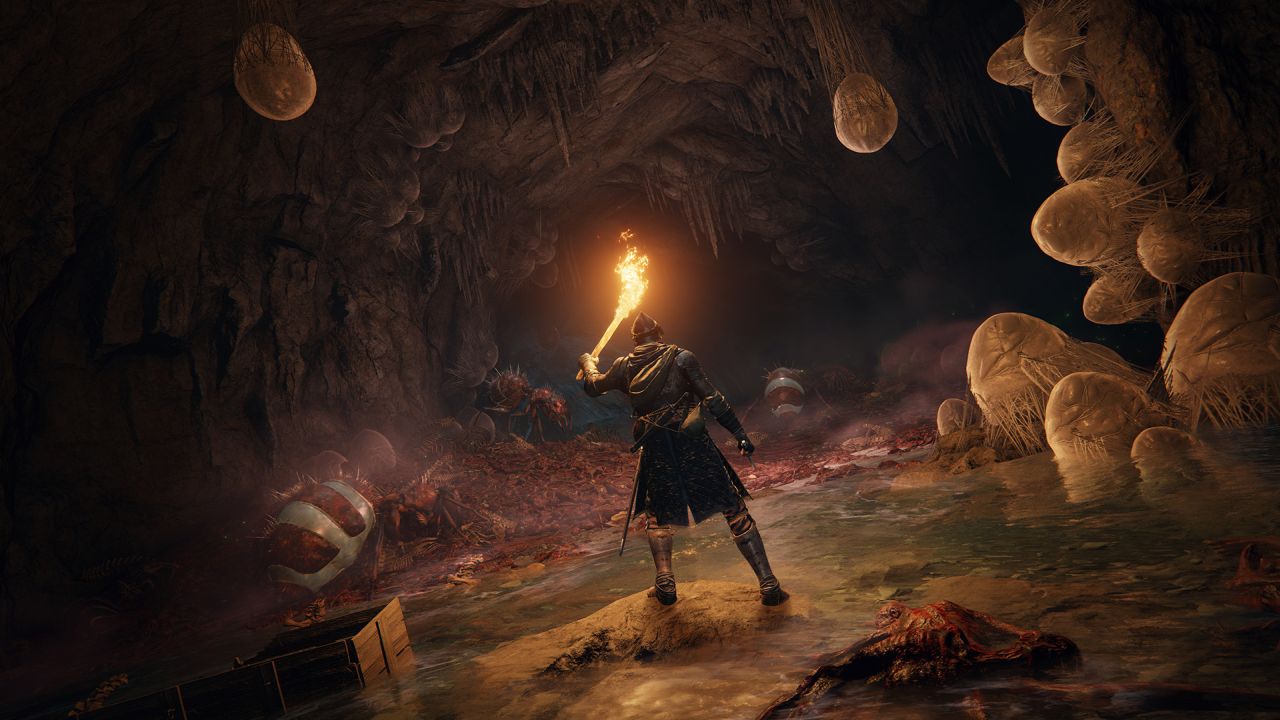
To keep players on track, the respawn points on the map feature a directional guide to point players to the next boss or challenge. There is also a new mechanic that grants players an extra health flask for defeating a group of enemies. This is an incredibly simple and yet incredibly useful addition that helps push players along in their exploration, instead of agonizing over a decision to play it safe and return to the save point to refill the very limited health flasks that you carry. And yes, getting just one extra health flask is incredible, which harkens back to the game's difficulty.
The sense of discovery is always extremely high because Elden Ring continues the tradition of absolutely minimal guidance for players. However, it can also be a downside. The map that you get is artistic and not very detailed, and only shows locations of the bonfires. You will meet many NPCs, but they often speak in riddles, and so the quest system continues to be extremely obtuse. Players sort of have to figure out things on their own, without so much as a hint that there is even a quest that exists. The game doesn't even have a simple journal so you can keep track of characters or review previous dialogue. You get many items with often lengthy descriptions that are full of lore, and yet of little practical hints. This means you can easily miss huge chunks of the experience, from optional bosses to entire dungeons, and key items. Elden Ring remains steadfast in its cryptic nature, which is a double-edged sword – the incredible sense of discovery can be hampered by players missing out on content entirely. Sure, you could go and look at a million guides available online, but this then derives you of the incredible highs of finding out something for yourself. Much like the difficulty level, nobody is asking for an easy mode or for a map full of quest markers, but perhaps a sliver of additional help, even as simple as a quest log or a journal, would go a long way to make this great experience accessible to more players.
If you find the game very challenging – which is pretty much guaranteed, and should continue to be re-iterated – the summon system and the return of multiplayer can help. The new summoning system allows you to call upon a ghostly companion – a large jellyfish, a group of wolves, or even a copy of yourself – to help in combat. You'll have to find these summoning spells first, and they can be critical to your success by helping pull the aggro of the enemies or the boss away from you, for a moment of respite and new back stab opportunities. It's a very helpful mechanic in the face of the new tough and very aggressive bosses.
Playing while connected to the Internet also offers a variety of benefits, mostly the same as previous games. You will find messages left behind by other players, which vary in their helpfulness and truthfulness. You can touch bloodstains to see how others have perished, and random ghosts of players reveal their actions in the area. The summoning system allows for PvE and PvP with others, and with the addition of a password it's easier to group up with your friends. However, Elden Ring is still not the traditional multiplayer experience where you can adventure together, but is instead mostly focused on limited-time interactions. You can call upon others to help you in a specific area, or a boss fight, but they will leave your world shortly after and also if they perish in combat. You also can't use your mounts, which makes some bosses prohibitive to do in co-op. Both players get drops and items, but only the host gets progress saved and special items from bosses. You'll also be open to PvP invasions from others, and even if you go offline, AI enemies can still invade, which can be an annoyance. Overall though, multiplayer helps the world feel more connected and alive, but you can turn it off for a full sense of immersion.
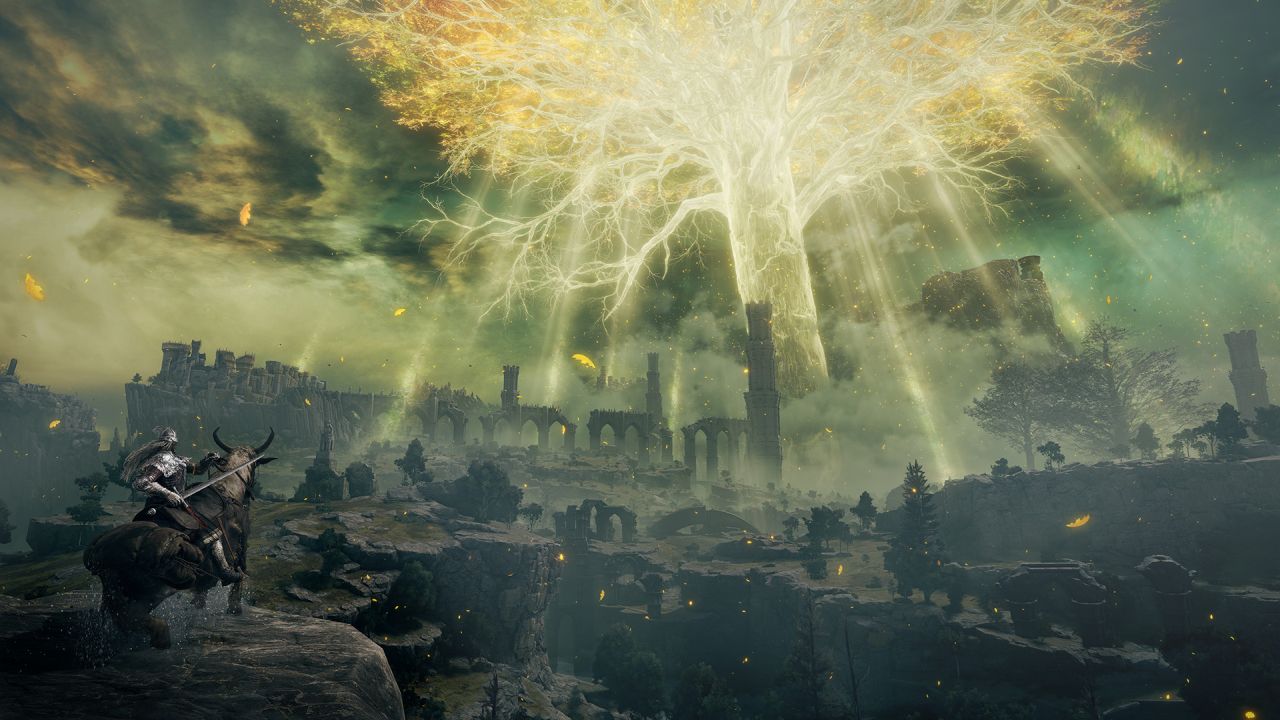
And what an immersive world it is. The art style continues to be excellent all around, though familiar to fans of this series. From the creative weapon and armor designs, to otherworldly and hideous enemies, across the dark dungeons and overbearing castles, the land is filled with a sense of dread and wonder. The addition of time of day and weather changes, along with a haunting ambient soundtrack that kicks up during boss battles, make for an incredible sense of atmosphere. The clanking of your armor, the sound of enemy's boots hitting the concrete floors, the echoing of enemy cries as they perish – it all comes together in a hauntingly beautiful way.
While the art and sound design are great, the game is still a bit lacking in the technical aspects. On PS5, the game sometimes runs into some framerate issues, which is not ideal for a game that's so demanding and where player reactions are critical. This happens despite the game looking fairly dated, as far as textures and special effects go. It just doesn't have the same level of technical prowess as even the Demon's Souls PS5 remake from 2020.
Elden Ring is an excellent continuation of the experience that FromSoftware has been building for the past decade. It takes the familiar Dark Souls formula and transposes it into an open world design without missing a beat. Not only that, it adds incredibly thoughtful mechanics that seamlessly integrate into the new bigger scope. The excellent level design and exploration elements are turned up to eleven, and the sense of wonder, the striking art style, and haunting sound design all combine for a highly memorable adventure. However, this great game remains isolated behind its tall castle walls - the challenging combat and general obscurity. It's still a title that's not for the faint of heart, and with no difficulty settings to speak of, you will have to live and die by the sword (or wand, as it were). And the lack of guidance is sometimes insurmountable, without resorting to online help, as the game offers simply too few hints to track your progress or the quest possibilities. The excellent art style is also slightly undermined by the occasional performance issues and somewhat dated visuals. If you have already enjoyed – or were on the fence about – the previous Dark Souls games, Elden Ring is an instant recommendation. But for newcomers, while there are aspects that make it more accessible, it's still a tough as nails experience to get into.
 Comments
Comments



















